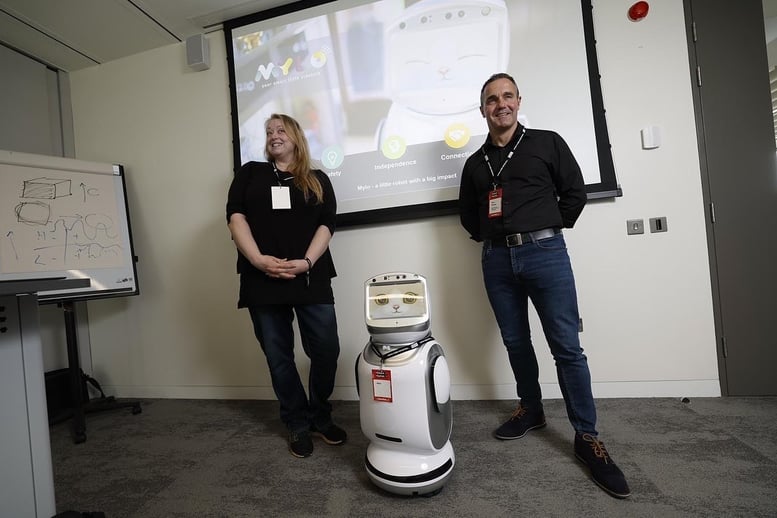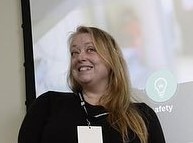Candace Lafleur graduated from Trinity’s Executive MBA in 2017. During her studies, she founded her own medtech robotics company, CR Robotics. Here, she tells us how her business came to be and how the Trinity MBA supported and informed her entrepreneurship.
 Image: Candace Lafleur hosts a masterclass at Future Human in Trinity Business School. © Conor McCabe
Image: Candace Lafleur hosts a masterclass at Future Human in Trinity Business School. © Conor McCabe
I’m Canadian but moved to the UK for work. While I was working in London, I had a major stroke and was later diagnosed with neurosarcoidosis, a very rare inflammatory disease that affects the nervous system. It was a time of intense change, so naturally my priorities and interests shifted after my recovery, and that led me to an interest in long-term healthcare and social care, particularly in terms of how robotics could have helped me get home faster after my stroke. I knew I wanted to develop technology to help people in similar situations.
When I was deciding where to get my MBA, I chose Trinity because I knew it had a great international reputation. As a result of my medical condition, I have the memory of a goldfish, my handwriting is barely legible, and I have narcolepsy. Trinity was really supportive. I was hesitant to contact the Disability Service because I don’t want my condition to define me, but I’m so glad I did; they were really helpful and allowed me to take all my exams on a computer.
While studying, I kept thinking about my idea. I remember Michael Flynn, the director of executive education at Trinity Business School, gave a lecture in the entrepreneurship module. It was about failure and the lifecycle of companies. He spoke about the importance of recognising an opportunity and jumping on it, and it made me feel like I should just go for it, because what was the worst that could happen? So one day I took the plunge, got a small team together, and we started researching.
It was great to found this company while doing my MBA because with every module I studied, I found practical ways to develop my start-up. I learnt so much from my classmates and professors. I’d be sitting in class emailing my staff, telling them ‘We need to start doing this!’! The whole MBA was relevant, not overly theoretical, and everything I learned I could practically apply.
My company produces robot home assistants called Mylo, for people with dementia or who are going through stroke rehabilitation. He’s about hip height, connects to your mobile phone, can help people to live more independently, and ensure they get support in the event of medical emergencies.
For example, if someone had a fall, Mylo would recognise that, and then automatically video call a relative or loved one so they can see what’s going on. He sends reminders to take medication, show patients where their medication is stored, and give reminders about appointments or home care help visits.
The business had excellent momentum when I left Trinity, but it took quite a hit during Covid-19. However, we’re near to closing a £2.6 million fundraising round, so that’s exciting.
I was so fortunate to be founding my company while doing the Trinity MBA. The modules gave me the push to jump in and do it, but also taught me how to control the risk, set it up, protect myself and what I’m doing. I could take literally anything I learned in any given day in class and apply it to my company.


